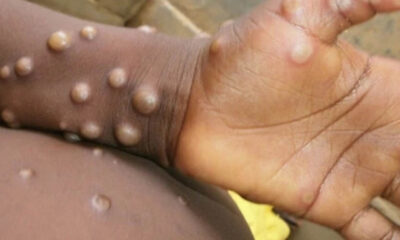Health
WHO dismisses report of link between smartphone use and brain cancer

WHO dismisses report of link between smartphone use and brain cancer
A recent World Health Organization (WHO) analysis has found no link between smartphone use and brain cancer. Concerns over radiation from mobile devices have persisted for decades, and in 2011, the WHO’s cancer division classified this radiation as “possibly carcinogenic to humans.”
However, a new study based on several research papers dating back to 1994 found no connection between cellphone usage and cancer, even among heavy users who make frequent calls. The study concluded that the incidence of brain cancers has not increased in correlation with increased mobile phone use.
The research team of eleven specialists from ten countries, including the Australian government’s radiation protection authority, reviewed 63 studies from 1994 to 2022. They examined possible links between exposure to radio waves from wireless technology — such as televisions, baby monitors, and cellphones — and various cancers, including brain and salivary gland tumours and leukaemia.
READ ALSO:
- Trucks stranded at depots as petrol scarcity worsens
- Mystery of Dangote Refinery in Nigerian oil politics – Farooq Kperogi
- Terrorists forcing us to work on their farms – Niger residents
The study found that despite the skyrocketing use of wireless technology, the occurrence of cancers has not increased to a corresponding degree. This finding holds true even for individuals who have been using mobile phones for over a decade or frequently engage in lengthy phone conversations.
Mark Elwood, a professor of cancer epidemiology at the University of Auckland in New Zealand and a co-author of the study, stated that none of the key research questions indicated elevated risks.
This review aligns with other similar studies. The WHO and other international health organizations have previously stated that there is insufficient evidence to suggest that mobile phone radiation poses a health risk. However, they have encouraged further research.
WHO dismisses report of link between smartphone use and brain cancer
Health
Scientists working to extend human lifespan to 250 years — Expert

Scientists working to extend human lifespan to 250 years — Expert
A leading medical expert, Dr. Ibrahim Wada, has suggested that advancements in medical technology and genetic engineering could push the human lifespan to 250 years in the next 30 to 40 years.
Wada, the founder of Nisa Medical Group, made this claim while delivering the Second Nimi Dimkpa Briggs Legacy Lecture at the University of Port Harcourt (UNIPORT) on Thursday.
His lecture, titled “The Longevity of Man,” explored the rapid pace of scientific breakthroughs that may soon redefine human aging.
He pointed to remarkable progress in genetic science, highlighting the creation of artificial eggs and sperm from human saliva, which could eventually lead to babies being grown in artificial wombs.
“This technology has already produced live rats. It is only a matter of time before humans benefit from similar advancements,” he said.
Wada, an Associate Professor of Obstetrics and Gynaecology at Abubakar Tafawa Balewa University, Bauchi, noted that innovations in stem cell research, artificial organs, and genetic reprogramming could revolutionize human health and longevity.
READ ALSO:
- Lawyers fault Senate’s suspension of Natasha Akpoti-Uduaghan
- Simon Ekpa accounts frozen for alleged terrorism financing
- Bandits kill 12 Zamfara community guards, vigilantes
“Recreating stem cells from a person’s genes and reintroducing them into the body can regenerate dead cells and significantly extend lifespan,” he explained. “In another 30 to 40 years, it will be normal for individuals to expect to live for 200 or even 250 years. This will happen because humanity has now entered the age of computer reprogramming.”
Despite the potential of these innovations, Wada expressed concern that such advanced treatments are not yet accessible in Nigeria. He also underscored the importance of lifestyle choices in promoting longevity, emphasizing regular medical check-ups, a balanced diet, exercise, and adequate rest.
“Rest is essential for brain function. So, when it is time to rest, you must allow the brain to rest – no compromise,” he advised.
During the event, UNIPORT Vice-Chancellor, Prof. Owunari Georgewill, reflected on the legacy of Prof. Nimi Briggs, describing him as a visionary leader and academic powerhouse.
“This is because it is not the breath we take, but the fire we ignite,” Georgewill remarked, raising the question of whether longevity is purely biological or tied to a person’s impact on the world.
Prof. Ngozi Orazulike, Chair of the Nimi Briggs Professorial Chair in Obstetrics and Gynaecology, praised Briggs’ significant contributions to medicine, education, and philanthropy.
Meanwhile, the late professor’s son, Nima Briggs, expressed gratitude for the continued recognition of his father’s legacy.
“It is humbling to see my father’s legacy live on, with events still being organised to honour his memory,” he said.
Scientists working to extend human lifespan to 250 years — Expert
Health
How to practise healthy Ramadan fast — Experts

How to practise healthy Ramadan fast — Experts
Ramadan fast is a spiritual obligation for Muslims to abstain from all food and drinks from dawn to sunset for 29/30 days.
Medical experts say fasting has health benefits. They advise people observing the Ramadan fast to adopt some health practices during the period.
A consultant family physician at the Federal Teaching Hospital Gombe, Dr Nuhu Ardo Kumo, said all those observing Ramadan fast should endeavour not to miss their ‘Sahur ‘ which is eaten during pre-dawn period.
According to him, it is very much encouraged so that they can keep fit.
He added that doing so provides energy and helps prevent dehydration.
He said, “The Sahur should contain much of carbohydrates because of the energy that is required. Protein, milk and a lot of water should be taken during that period.
“Secondly they should stay hydrated, and one thing that keeps one hydrated is taking a lot of water during the hours of none fasting, especially after the breakage of the fast and also during the Sahur.
“It is expected one would take a lot of water, lots of vegetables and fruits like watermelon, cucumber and oranges which helps to keep one hydrated.”
Dr Kumo also advised people observing Ramadan fast to avoid caffeinated drinks and sugary drinks because they make one dehydrated easily.
READ ALSO:
- NNPC Ltd reduces price of petrol to N860 per litre
- Tinubu’s 2027 Ambition: APC already has candidate, insists Orji Kalu
- Church, homes targeted in Abuja suburb robbery, survivors recount ordeal
He also advised physical activities, like walks carried out early in the morning when the sun is not too hot or in the evening.
“So that they do not become dehydrated and they are also encouraged to carry out other lighter exercises”, he said.
He stated that, “However, those whose working schedules involve working under the sun, should at least take regular breaks, they shouldn’t continuously be under the sun to avoid dehydration.”
Dr Kumo further explained that everyone observing fasting is encouraged to wear light colours and loose fitting clothes that are made of natural fibers, to avoid sweating too much and loss of water in the body.
While advising they should avoid dark coloured clothes, he also advised them to
be taking lots of showers.
Dr Kumo said, “If water is available, fasting faithful are encouraged to take a lot of showers that would help them in maintaining good hydration.
“Lastly, if fasting becomes extremely challenging, especially due to health problems or extreme weather conditions, it has been enshrined in the Islamic rites or law that one is expected to break the fast and pay off when one is healthy or when the weather is favorable .”
The medical expert also noted that individuals observing fasting should avoid staying under the sun for too long and engaging in rigorous activities that would make one get tired easily or become dehydrated.
He further advised that they should avoid heat production units, especially those working in industries and other areas that deal with a lot of heat.
“Affected staff should be encouraged to advocate for change of working conditions during the period from their employers.
“Faithful observing fasting should avoid smokers of cigarettes and other areas that emit a lot of smoke,” he advised.
Dr Kumo added that older people above 65 years old are only encouraged to fast if they can, “If they cannot, the Sharia has given them the option of feeding the needy.”
A medical doctor at the Bauchi Specialist Hospital, Dr Suleiman Auwal said the health benefits of fasting include weight loss, decreased risk of metabolic diseases such as diabetes mellitus, significant benefits to cancer patients and improving overall fitness.
He said others are: it protects the fasting person from obesity, boosting cognitive performance, decreased risk of chronic illness and boosting immunity.
Dr Auwal said breastfeeding mothers are medically advised not to fast because, during breastfeeding, the metabolic demands of the mother increases because she is feeding two lives – hers and the baby’s.
He said this is coupled with the stress she goes through during pregnancy. Therefore the mother needs additional nutritional support apart from her routine meal.
“The aged (elderly people are also not advised, medically to fast for obvious reasons – as age advances, metabolic demand of the body increases and without proper nutritional support, the immunity, which is, of course, fragile in the elderly, will certainly go down and the person is at risk of developing many serious health issues, among them severe bacterial and viral infections,” he explained.
Dr Auwal said people should also avoid overfeeding during Ramadan.
How to practise healthy Ramadan fast — Experts
Health
NAFDAC withdraws approval of major anti-malaria drug

NAFDAC withdraws approval of major anti-malaria drug
The National Agency for Food and Drug Administration and Control (NAFDAC) has officially stopped the registration of Artemether/Lumefantrine dry powder for oral suspension, a widely used multi-dose anti-malarial medication.
The agency announced this decision through Public Alert No. 01/2025, posted on its website Thursday, citing concerns about the product’s stability after reconstitution, which may compromise its effectiveness.
According to the alert, “stability studies have shown that once reconstituted, the Artemether/Lumefantrine oral suspension becomes unstable, which can result in a loss of efficacy.”
This suspension covers both locally manufactured and imported versions of the product. NAFDAC stated it would no longer process new registrations, renewals, or variation applications for the drug.
READ ALSO:
- International fraud syndicates setting up cells in Nigeria – EFCC
- Senator Akpoti-Uduaghan threatens to expose Akpabio
- Ganduje says Amaechi, el-Rufai, others will regret dumping APC
The agency warned that the instability of the suspension could lead to severe health consequences, including “worsening health conditions, increased risks of complications, treatment delays, or even death.”
In response, NAFDAC has instructed its zonal directors and state coordinators to conduct surveillance operations and remove the affected products from circulation.
The agency urged healthcare professionals, distributors, and retailers to halt the importation, sale, and distribution of the product immediately. Consumers and medical practitioners have also been encouraged to report any sightings of the drug or instances of substandard or counterfeit medicines to the nearest NAFDAC office.
Reports of adverse reactions or side effects can also be submitted via NAFDAC’s E-reporting platforms or through the Med-safety app, available on both Android and iOS devices.
NAFDAC confirmed that this alert would be shared with the World Health Organisation’s Global Surveillance and Monitoring System (GSMS).
NAFDAC withdraws approval of major anti-malaria drug
-

 Education13 hours ago
Education13 hours agoOver two million candidates register for 2025 UTME, JAMB closes registration
-

 metro2 days ago
metro2 days agoALGON drags FG, states to court over local govt funding, autonomy
-

 metro3 days ago
metro3 days agoReginal Daniels removes husband’s name from new video, Ned Nwoko reacts
-

 metro2 days ago
metro2 days agoOpen loud preaching in Anambra attracts N500,000 fine – Soludo
-

 metro2 days ago
metro2 days agoBlackout: TCN, DisCos debunk fresh grid collapse, supply hits 5,093MW
-

 metro22 hours ago
metro22 hours agoUse of worn-out tyre lands FRSC sector commander in trouble
-

 Education22 hours ago
Education22 hours agoVarsity workers protest non-payment of salary increment arrears
-

 metro3 days ago
metro3 days agoTinubu offers fresh appointment to Jega













